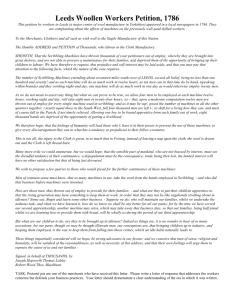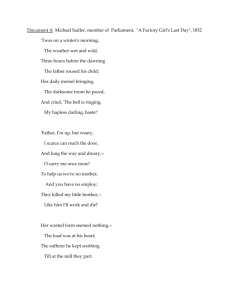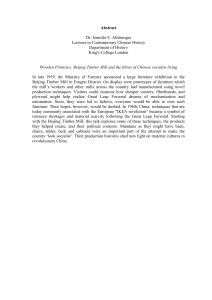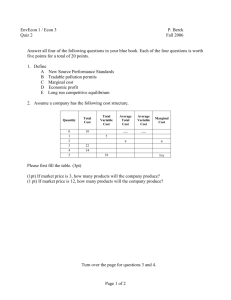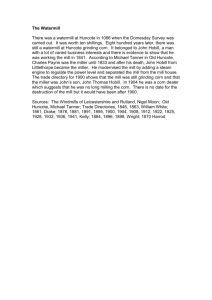1. Leeds Woollen Workers Petition, 1786
advertisement
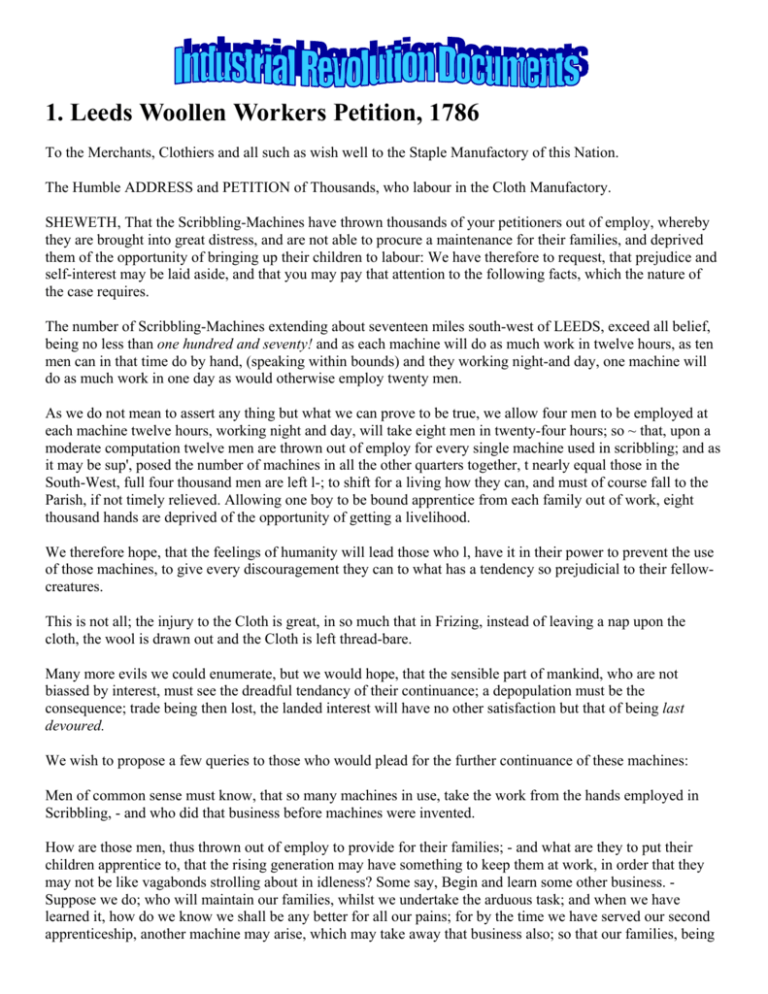
1. Leeds Woollen Workers Petition, 1786 To the Merchants, Clothiers and all such as wish well to the Staple Manufactory of this Nation. The Humble ADDRESS and PETITION of Thousands, who labour in the Cloth Manufactory. SHEWETH, That the Scribbling-Machines have thrown thousands of your petitioners out of employ, whereby they are brought into great distress, and are not able to procure a maintenance for their families, and deprived them of the opportunity of bringing up their children to labour: We have therefore to request, that prejudice and self-interest may be laid aside, and that you may pay that attention to the following facts, which the nature of the case requires. The number of Scribbling-Machines extending about seventeen miles south-west of LEEDS, exceed all belief, being no less than one hundred and seventy! and as each machine will do as much work in twelve hours, as ten men can in that time do by hand, (speaking within bounds) and they working night-and day, one machine will do as much work in one day as would otherwise employ twenty men. As we do not mean to assert any thing but what we can prove to be true, we allow four men to be employed at each machine twelve hours, working night and day, will take eight men in twenty-four hours; so ~ that, upon a moderate computation twelve men are thrown out of employ for every single machine used in scribbling; and as it may be sup', posed the number of machines in all the other quarters together, t nearly equal those in the South-West, full four thousand men are left l-; to shift for a living how they can, and must of course fall to the Parish, if not timely relieved. Allowing one boy to be bound apprentice from each family out of work, eight thousand hands are deprived of the opportunity of getting a livelihood. We therefore hope, that the feelings of humanity will lead those who l, have it in their power to prevent the use of those machines, to give every discouragement they can to what has a tendency so prejudicial to their fellowcreatures. This is not all; the injury to the Cloth is great, in so much that in Frizing, instead of leaving a nap upon the cloth, the wool is drawn out and the Cloth is left thread-bare. Many more evils we could enumerate, but we would hope, that the sensible part of mankind, who are not biassed by interest, must see the dreadful tendancy of their continuance; a depopulation must be the consequence; trade being then lost, the landed interest will have no other satisfaction but that of being last devoured. We wish to propose a few queries to those who would plead for the further continuance of these machines: Men of common sense must know, that so many machines in use, take the work from the hands employed in Scribbling, - and who did that business before machines were invented. How are those men, thus thrown out of employ to provide for their families; - and what are they to put their children apprentice to, that the rising generation may have something to keep them at work, in order that they may not be like vagabonds strolling about in idleness? Some say, Begin and learn some other business. Suppose we do; who will maintain our families, whilst we undertake the arduous task; and when we have learned it, how do we know we shall be any better for all our pains; for by the time we have served our second apprenticeship, another machine may arise, which may take away that business also; so that our families, being half pined whilst we are learning how to provide them with bread, will be wholly so during the period of our third apprenticeship. But what are our children to do; are they to be brought up in idleness? Indeed as things are, it is no wonder to hear of so many executions; for our parts, though we may be thought illiterate men, our conceptions are, that bringing children up to industry, and keeping them employed, is the way to keep them from falling into those crimes, which an idle habit naturally leads to. These things impartially considered will we hope, be strong advocates in our favour; and we conceive that men of sense, religion and humanity, will be satisfied of the reasonableness, as well as necessity of this address, and that their own feelings will urge them to espouse the cause of us and our families Signed, in behalf of THOUSANDS, by Joseph Hepworth Thomas Lobley Robert Wood Thos. Blackburn 2. Cotton manufacturer on the hours of labor Here, then, is the "curse" of our factory-system; as improvements in machinery have gone on, the "avarice of masters" has prompted many to exact more labour from their hands than they were fitted by nature to perform, and those who have wished for the hours of labour to be less for all ages than the legislature would even yet sanction, have had no alternative but to conform more or less to the prevailing practice, or abandon the trade altogether. This has been the case with regard to myself and my partners. We have never worked more than seventy-one hours a week before Sir JOHN HOBHOUSE'S Act was passed. We then came down to sixty-nine; and since Lord ALTHORP's Act was passed, in 1833, we have reduced the time of adults to sixty-seven and a half hours a week, and that of children under thirteen years of age to forty-eight hours in the week, though to do this latter has, I must admit, subjected us to much inconvenience, but the elder hands to more, inasmuch as the relief given to the child is in some measure imposed on the adult. But the overworking does not apply to children only; the adults are also overworked. The increased speed given to machinery within the last thirty years, has, in very many instances, doubled the labour of both. 3. Evidence of Textile Workers in Wilson's Mill, Nottingham: Hannah Goode: "I work at Mr. Wilson's mill. I think the youngest child is about 7. I daresay there are 20 under 9 years. It is about half past five by our clock at home when we go in....We come out at seven by the mill. We never stop to take our meals, except at dinner. William Crookes is overlooker in our room. He is cross-tempered sometimes. He does not beat me; he beats the little children if they do not do their work right....I have sometimes seen the little children drop asleep or so, but not lately. If they are catched asleep they get the strap. They are always very tired at night....I can read a little; I can't write. I used to go to school before I went to the mill; I have since I am sixteen." Mrs. Smith: "I have three children working in Wilson's mill; one 11, one 13, and the other 14. They work regular hours there. We don't complain. If they go to drop the hours, I don't know what poor people will do. We have hard work to live as it is. ...My husband is of the same mind about it...last summer my husband was 6 weeks ill; we pledged almost all our things to live; the things are not all out of pawn yet. ...We complain of nothing but short wages...My children have been in the mill three years. I have no complaint to make of their being beaten...I would rather they were beaten than fined." 4. Samuel Courtauld built a silk mill in 1825 in Halstead, Essex (South East England). Before the Industrial Revolution, Halstead was an agricultural community with a cottage industry producing woolen cloth. In Halstead, as elsewhere in England, unemployment among depressed farming households and former wool workers forced people to find work outside the home. Because their labor was cheap, women more than men were recruited into the textile factories that sprang up all over Britain in the 19th century. This is a chart of the Courtauld workforce in 1860. The wages are in British schillings. Number 1 26 6 3 1 16 18 Weekly Wages 1000 pounds per year 15s-32s 17s-25s 14s-21s 15s 14s-15s 10s-15s MALES Mill Manager (Also got 3 per cent of the profits) Overseers and clerks Mechanics and engine drivers Carpenters and blacksmiths Lodgekeeper Power loom machinery attendants and steamers Mill machinery attendants and loom cleaners Spindle cleaners, bobbin stampers and packers, 5 5s-12s messengers, sweepers 7s-10s Watchmen 5s-10s Coachmen, grooms and van driver 38 2s-4s Winders 114 Total Males Weekly FEMALES Number Wages 4 10s-11s Gauze examiners 4 9s-10s Female assistant overseers 16 7s-10s Warpers 9 7s-10s Twisters 4 6s-9s Wasters 589 5s-8s Weavers 2 6s-7s Plugwinders 83 4s-6s Drawers and doublers 188 2s-4s Winders Total Females 899 GRAND TOTAL WORK FORCE 1013

